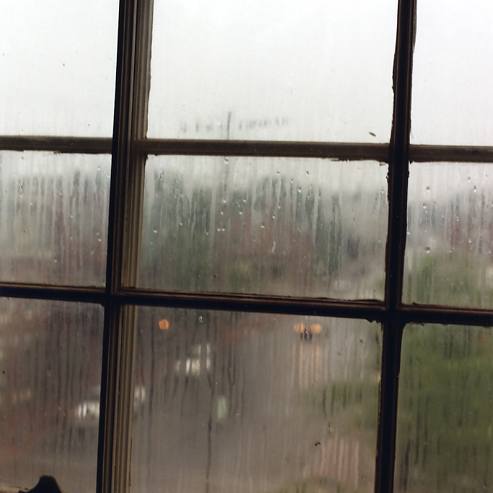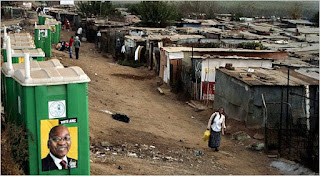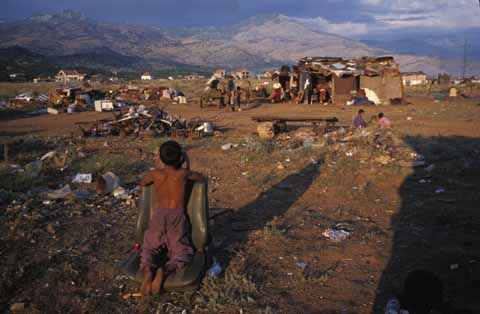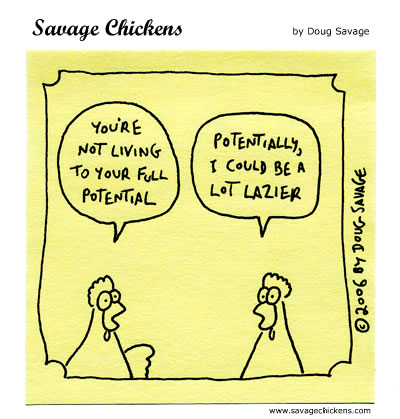
From
http://www.economist.com/printedition/displaystory.cfm?story_id=13491950THE outcome is not in doubt. But the elections that will be held on April 22nd will still be the most important since South Africa’s first fully democratic ballot in 1994. The African National Congress (ANC) will win by a landslide, as it has always done over the past 15 years. The new parliament will then elect the country’s president, now certain to be the ANC’s leader, Jacob Zuma. But what will happen afterwards? Will Africa’s biggest economy continue along the path to a stable multi-party democracy? Or will it sink into despotism, as so many other African countries did after liberation?
South Africans may well consider that outcome impossible. Democratic institutions are robust. Elections are free. As a member of the G20, South Africa hobnobs with the richest and most powerful countries in the world. Its post-apartheid constitution is among the most progressive. Its judiciary is impressively independent, its press unfettered, its civil society vibrant. Many Africans are nevertheless deeply worried about what might happen to the country under a President Zuma and an all-powerful, perhaps even vengeful, ANC.
The heady ideals of Nelson Mandela’s “rainbow nation” were bound to give way to greater realism. But it has gone beyond that. Many now share the “disillusionment, resentment and rage tinged with despair”, of which André Brink, an Afrikaans author and former anti-apartheid campaigner, writes in his recent memoir. Since the ANC first came to power in 1994 an estimated 800,000 whites have left the country, taking their skills with them; 4.5m, representing 9% of the population, remain. Crime has certainly played a part: though figures are hard to compare, South Africa has one of the world’s highest murder rates. But the dominance of the ANC has also been a powerful factor.
Whites are not alone in their pessimism. “We are in a bad place at the moment in this country,” laments Archbishop Desmond Tutu, a liberation hero turned government scourge. After the nation had thrown off the shackles of injustice and oppression, he had hoped to see a new age of freedom and justice for all. But “we have let down our guard and quickly forgotten the struggles of our past…Please allow us old people to go to the grave smiling, not with our hearts broken.”
The manner in which Mr Zuma’s eight-year tussle with the courts was brought to an end has shocked South Africans. On April 6th the supposedly independent National Prosecution Authority (NPA) announced that it was withdrawing all charges of corruption, racketeering, tax-evasion, money-laundering and fraud against the ANC leader. The actual merits of the case were not in question, it said. Nor was the prosecution in any way flawed. The issue was the (alleged) manipulation of the timing of the announcement of the charges in an apparent attempt to thwart Mr Zuma’s political ambitions. This made it “neither possible nor desirable” to continue with the prosecution.
Yet the grounds for dropping the case were puzzling. The charges against Mr Zuma had been serious. He was accused of accepting more than 4m rand ($596,000) between 1995 and 2005 from his friend and former financial adviser, Schabir Shaik, in exchange for using his influence to help secure government contracts for Mr Shaik’s companies. Sentencing Mr Shaik to 15 years imprisonment in 2005, the presiding judge said that the payments to Mr Zuma “can only have generated a sense of obligation in the recipient”. President Thabo Mbeki promptly sacked him as his deputy. A few days later Mr Zuma was indicted in his turn. He has always denied the charges.
Both Mr Zuma and Mr Shaik claim that the money was intended as a loan, part of which Mr Zuma says he has now repaid, though he does not say how much. Now that the charges have been dropped, he says he feels vindicated; but he has not been acquitted. A cloud of suspicion still hangs over him. He has never properly explained his relationship with Mr Shaik. It did not help when, last month, he announced that if elected he would consider granting a pardon to his friend. Three days later Mr Shaik, suffering from hypertension and depression, was released from jail on “medical parole”, normally reserved for the dying. He had served two years and four months of his 15-year sentence.
The rise of the goatherdBorn of Zulu peasant stock, Mr Zuma herded his grandfather’s goats rather than going to school. He joined the ANC in his mid-teens. From then until he was almost 50 he devoted his life to the liberation struggle, first as a prisoner on Robben Island (with Nelson Mandela), then as an activist in the armed underground, and finally as the ANC’s head of intelligence. He never had to worry about money; the party took care of that.
But on his return from exile at the end of apartheid in 1990, he found himself with no settled home, no solid job and no money. It would not surprise South Africans if, like many others who had sacrificed their lives to the cause while others at home grew rich, he felt he was owed something.
Financial wrongdoing within the ANC’s ranks is widespread and tolerated, though many have been prosecuted. A poll taken shortly before Mr Zuma’s charges were dropped showed that just half of ANC members believed him to be innocent. Yet nearly three-quarters continued to support him “wholeheartedly”.
From 1994 until 1999 Mr Zuma served as the local minister for economic affairs and tourism in his native KwaZulu-Natal. But his pay was meagre, his lifestyle lavish and he already had three wives and numerous children to support. At one point he thought he might throw it all in. But Mr Shaik and his brothers, who had worked alongside him in the underground, persuaded him not to, arguing that the country needed leaders like him. For ten years Mr Shaik picked up Mr Zuma’s tab for virtually everything, from his luxury homes and expensive cars to his traffic fines and children’s schooling. All this is well documented. In African culture there is a sense of obligation to help relatives and friends in times of need. Mr Shaik’s level of care, though, appears to have gone beyond the call of duty.
Mr Zuma insists that there was never any case against him. Nevertheless, after the dismissal of the charges, he strove to sound presidential. Now was not the time for vengeance, he told reporters: “We have a country to run, not individuals to chase.” His allies take a different view. They are baying for blood, accusing Mr Mbeki—whom Mr Zuma’s allies in the ANC ousted as party and then as national president—of being behind a plot to bring down Mr Zuma. At a “victory” rally on April 7th Zwelinzima Vavi, leader of Cosatu, South Africa’s biggest trade-union federation and one of the ANC’s partners in the ruling tripartite alliance with the Communists, demanded that “Number One, that big man…must answer in court.”
This is typical of Mr Zuma’s tactics: he lets others do the dirty work for him. One of his most-feted “bully boys” is Julius Malema, leader of the ANC’s powerful Youth League. Decried by his detractors as an arrogant dimwit but lauded by his comrades as a sharp and gifted speaker, the chubby-cheeked 28-year-old delights in provocation. The woman who accused Mr Zuma of rape in 2005 must have had a “nice time”, he suggested, otherwise she wouldn’t have stayed for breakfast. Helen Zille, the feisty (white) leader of the Democratic Alliance (DA) and a former anti-apartheid campaigner, was a “racist” and “colonialist”. The Congress of the People (COPE), a new party set up by ANC rebels after Mr Mbeki’s undignified ouster last September and now the ANC’s first serious black-led challenger, was nothing but a “Western puppet”.
Occasionally Mr Malema is deemed to have taken a step too far, as when he declared last summer that the Youth League was “prepared to take up arms and kill for Zuma” if his prosecution went ahead. The public uproar was such that the ANC felt obliged to rap him over the knuckles. But otherwise he is almost never reined in, leading to the assumption that the ANC top brass, including Mr Zuma, do not altogether disapprove.
Dressed in natty designer suits and matching silk ties, the beaming Mr Zuma, seeks to reassure his white audiences, gathered in air-conditioned five-star hotels, with his down-to-earth wit and technocratic (often rather boring) speeches. But dressed in a bright-yellow ANC T-shirt and shades, belting out his “Umshini Wami” (“Bring me my machinegun”) theme song to his adoring black supporters in sweltering sports stadiums, he is a different man. Then he makes blunter, more sinister remarks, as when he called on potential defectors to COPE to think again. “It is cold out there if you are out of the ANC,” he warned them. “Very cold.”
The positive sideAfter 15 years of uninterrupted, virtually unchallenged power, the ANC has evidently succumbed to many of the vices of one-party states: arrogance, nepotism, corruption, intimidation. Hardly a day seems to go by without some new scandal. Yet it has notched up some remarkable achievements, starting with the bloodless transition from white minority rule to full multiracial democracy. The ANC government has set up Africa’s only broad-based welfare state, providing cash benefits to 12.5m people compared with just 3m in 1996. To help get people out of the sprawling, squalid shanty towns it has built 2.7m low-cost homes, housing around 10m people. Some 80% of all households are now connected to electricity and clean water—up by a third since 1996. More than half of state schools no longer charge fees. Free health clinics are gradually being set up. After years of shameful denial of any link between the HIV virus and AIDS, some 60% of the 5.7m infected are at last receiving antiretrovirals. Violent crime may still be appallingly high, but it has been falling in almost all categories.

At the same time, a new black middle class has sprung up. An estimated 2.6m of South Africa’s 39m blacks (about 80% of the total population) now earn at least 6,000 rand a month, with many earning a lot more. That may not seem much by Western standards, but it is more than what nearly half of their compatriots earn in a year. These new rich go out to restaurants, drive cars and buy the latest fashions in air-conditioned malls. Most of the wealth, though, is still in the hands of whites—not so much because of discrimination, but because they have higher skills. Although absolute levels of poverty have dipped, the gulf between rich and poor is still widening. South Africa is now one of the most unequal countries in the world.
This has changed voting patterns. For the first time, South Africans will probably vote along socioeconomic lines as much as racial ones. Of the ANC’s supporters, the vast majority are black (96%), poor and little educated. The DA has an exactly opposite profile: predominantly white (around 64%), with a good sprinkling of Indians and coloureds (mixed-race), but almost no blacks. Its supporters are also older, richer and much better educated.
COPE fits neatly between these extremes. Its supporters are multiracial (about 60% black and 18% white), middle class, relatively well educated and well balanced across all age groups. Like the DA, the new party, with a bishop as its presidential candidate, likes to present itself as morally upright, with a commitment to rooting out corruption and upholding the constitution. But its image has been tarnished of late by the alleged link between a number of its main backers and the “conspiracy” against Mr Zuma.
South African elections are based on strict proportional representation. In the last national poll, in 2004, the ANC won a record 70% of the vote; the DA came second with 12.4%. This time the situation is more complex. About 3m more people have registered to vote and, with the buzz surrounding the emergence of COPE, turnout is also expected to be higher. This, combined with an unusually large number of undecided voters, makes it difficult to predict the results. Most pollsters are suggesting that the overall ANC vote will fall only slightly, to 61-64%, that the DA will get 11-16%, and that COPE will come a close third with a commendable 9-15%.
Because of Mr Zuma’s closeness to Cosatu and the Communists, some predict that he may preside over a radical shift to the left. But this seems unlikely, not least because some of his staunchest allies include wealthy black capitalists, who would resist such a move. Like many liberation fighters, Mr Zuma was once a member of the SACP, but quit in 1990 and went on to give his full backing to Mr Mbeki’s market-friendly economics. Although he has big plans to extend the welfare state, he also thinks it important to attract foreign investors. The high (fourth) place given to Trevor Manuel, South Africa’s highly regarded finance minister, on the ANC’s list of parliamentary candidates suggests he may want to keep Mr Manuel on in the post he has occupied since 1996.
Mr Zuma remains an enigma. When asked about his intentions when he comes to power, he simply says the ANC’s policies are his too—abroad, apparently, as well as at home. Asked for his reaction to the government’s “quiet diplomacy” on Zimbabwe and its backing for Sudan’s president, Omar al-Bashir, in his struggle with the International Criminal Court, Mr Zuma merely said that his approach would be the same as his predecessors’.
Recession’s shadowWith South Africa sinking into its first recession after 16 years of expansion, the challenges facing the next president are daunting. Business confidence is at a ten-year low. After growth averaging around 5% a year between 2004 and 2007, the economy is expected to contract by around 0.8% this year. Mining and manufacturing have been in free fall for six months. Exports and retail trade are following suit. Despite the boost given to the economy by preparations for next year’s football World Cup, which South Africa is hosting, and a government stimulus package of 690 billion rand over the next three years, the downturn will cut jobs and increase poverty. Only those who have held a “formal” job for at least four years may claim unemployment benefit. But, for the moment, voters seem to blame the global downturn rather than the government.
Will Mr Zuma be up to the job? Whites, in particular, are alarmed by his lack of formal education; his flamboyant polygamy (he recently married his sixth wife, 30 years his junior); his irresponsible attitude toward HIV/AIDS, as revealed at his rape trial; and his hidden years with the ANC underground, particularly as head of intelligence. In its 1998 report, the Truth and Reconciliation Commission accused the ANC in the 1970s and 1980s of “gross violations of human rights” and of “routine [use of] torture to extract information”.
A puzzling future for him, tooThen there are those worrying stray comments. He wants to review the status of the Constitutional Court (which has several times found against him), “because I don’t think we should have people who are almost like God in a democracy.” He loathes the press, which has certainly not been kind, slamming a “vicious media campaign designed to find me guilty in the court of public opinion”. His talk of rooting out the “lazy, corrupt and incompetent” from government sometimes suggests a purge of those he dislikes.
But Mr Zuma is as adored as much as he is loathed. After the heroic, aristocratic Mr Mandela and the aloof, technocratic Mr Mbeki, most South Africans seem to welcome the prospect of having a man of the people as their president. Mr Zuma is a good listener and a skilled conciliator. He works hard, and has impressive energy for a man just turned 67. He can exude great charm when he wants to.
Will he make a good president? That is hard to tell. It could go either way. The hope is that South Africa will continue along its current path of democratic progress and growing prosperity. But Mr Tutu will have to wait a little longer before being certain whether he can go to his grave smiling, or with a broken heart.




.jpg )

























